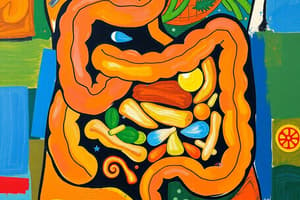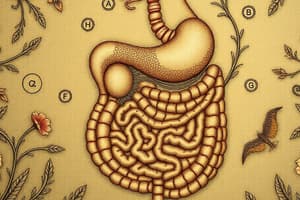Podcast
Questions and Answers
The following are accessory organs in digestion, except:
The following are accessory organs in digestion, except:
- liver
- tongue
- mouth (correct)
- teeth
That main organ of the gastrointestinal tract where the mechanical process occurs:
That main organ of the gastrointestinal tract where the mechanical process occurs:
- tongue
- small intestine
- stomach (correct)
- large intestine
It is an enzyme found in the mouth that digests carbohydrates:
It is an enzyme found in the mouth that digests carbohydrates:
- salivary amylase (correct)
- lingual lipase
- none of these
- pancreatic amylase
A wavelike motion in the propulsion of the bolus:
A wavelike motion in the propulsion of the bolus:
The following are protein enzymes found in the small intestine, except:
The following are protein enzymes found in the small intestine, except:
A movement of water concentration across a semi-permeable membrane from a region of higher water concentration to a region of lower water concentration:
A movement of water concentration across a semi-permeable membrane from a region of higher water concentration to a region of lower water concentration:
A movement of substances across a semi-permeable membrane from a region of lower concentration to higher concentration:
A movement of substances across a semi-permeable membrane from a region of lower concentration to higher concentration:
It is a catabolic process necessary for macroscopic food into a molecule that is small enough to be absorbed in the body's system:
It is a catabolic process necessary for macroscopic food into a molecule that is small enough to be absorbed in the body's system:
An accessory of the mouth that helps in churning the food:
An accessory of the mouth that helps in churning the food:
Digestion in the mouth undergoes:
Digestion in the mouth undergoes:
The soft solid that is swallowed is known from the mouth as:
The soft solid that is swallowed is known from the mouth as:
A sphincter that connects the stomach and duodenum:
A sphincter that connects the stomach and duodenum:
Enzyme found in the stomach that is activated in the secretion of HCl:
Enzyme found in the stomach that is activated in the secretion of HCl:
The following are brush border enzymes, except:
The following are brush border enzymes, except:
The bacteria in the large intestine can do the following, except:
The bacteria in the large intestine can do the following, except:
All of the following are true about carbohydrate digestion, except:
All of the following are true about carbohydrate digestion, except:
Which of the following is not true about protein digestion?
Which of the following is not true about protein digestion?
Movement of fat through the body after absorption involves the following steps, except:
Movement of fat through the body after absorption involves the following steps, except:
Which of the following is correct about fat absorption?
Which of the following is correct about fat absorption?
Phospholipids in digestion:
Phospholipids in digestion:
Which statement about protein digestion is false?
Which statement about protein digestion is false?
Carbohydrates are completely digested in the stomach.
Carbohydrates are completely digested in the stomach.
What is the role of bile salts in fat absorption?
What is the role of bile salts in fat absorption?
Absorbed fats are transported through the ______ system before entering the bloodstream.
Absorbed fats are transported through the ______ system before entering the bloodstream.
Match the following digestive components with their functions:
Match the following digestive components with their functions:
Which of the following organs primarily serves as the site for nutrient absorption in the gastrointestinal tract?
Which of the following organs primarily serves as the site for nutrient absorption in the gastrointestinal tract?
Osmosis is the movement of substances across a semi-permeable membrane from higher to lower concentration.
Osmosis is the movement of substances across a semi-permeable membrane from higher to lower concentration.
What is the name of the enzyme produced by the pancreas that digests proteins?
What is the name of the enzyme produced by the pancreas that digests proteins?
The soft mass formed in the stomach after food is mixed with gastric juices is called ______.
The soft mass formed in the stomach after food is mixed with gastric juices is called ______.
Which of the following describes the process where food is mechanically broken down in the mouth?
Which of the following describes the process where food is mechanically broken down in the mouth?
Match the digestive enzymes to their respective functions:
Match the digestive enzymes to their respective functions:
The primary function of the large intestine is to absorb nutrients from food.
The primary function of the large intestine is to absorb nutrients from food.
The wavelike motion that propels food through the digestive tract is known as ______.
The wavelike motion that propels food through the digestive tract is known as ______.
Flashcards
Accessory organs of digestion
Accessory organs of digestion
Organs that support but are not part of the main digestive tract.
Mechanical digestion
Mechanical digestion
Physical breakdown of food into smaller pieces.
Salivary amylase
Salivary amylase
Enzyme in saliva that digests carbohydrates.
Peristalsis
Peristalsis
Signup and view all the flashcards
Protein enzymes in small intestine
Protein enzymes in small intestine
Signup and view all the flashcards
Osmosis
Osmosis
Signup and view all the flashcards
Digestion
Digestion
Signup and view all the flashcards
Bolus
Bolus
Signup and view all the flashcards
Pyloric sphincter
Pyloric sphincter
Signup and view all the flashcards
Protein enzyme (stomach)
Protein enzyme (stomach)
Signup and view all the flashcards
Brush border enzymes
Brush border enzymes
Signup and view all the flashcards
Digestion in mouth
Digestion in mouth
Signup and view all the flashcards
Fat absorption
Fat absorption
Signup and view all the flashcards
Carbohydrate Digestion in Stomach
Carbohydrate Digestion in Stomach
Signup and view all the flashcards
What is an exception?
What is an exception?
Signup and view all the flashcards
Protein Digestion Begins Where?
Protein Digestion Begins Where?
Signup and view all the flashcards
Fat Absorption Path
Fat Absorption Path
Signup and view all the flashcards
Phospholipid Role in Digestion
Phospholipid Role in Digestion
Signup and view all the flashcards
What is the function of the tongue?
What is the function of the tongue?
Signup and view all the flashcards
What is chyme?
What is chyme?
Signup and view all the flashcards
What does the liver do in digestion?
What does the liver do in digestion?
Signup and view all the flashcards
What are brush border enzymes?
What are brush border enzymes?
Signup and view all the flashcards
What is the primary function of the large intestine?
What is the primary function of the large intestine?
Signup and view all the flashcards
What are the 4 processes of digestion?
What are the 4 processes of digestion?
Signup and view all the flashcards
What is the difference between diffusion and osmosis?
What is the difference between diffusion and osmosis?
Signup and view all the flashcards
What is the role of the ileocecal sphincter?
What is the role of the ileocecal sphincter?
Signup and view all the flashcards
Study Notes
Digestion Quiz 2 - Study Notes
- Accessory Organs (Digestion, except): Mouth, tongue, teeth.
- Mechanical Digestion (Main Organ): Stomach
- Carbohydrate Digestion Enzyme (Mouth): Salivary amylase
- Bolus Propulsion: Peristalsis
- Protein Enzymes (Small Intestine, except): Pepsin
- Water Movement (Semi-Permeable Membrane): Diffusion
- Substance Movement (Lower to Higher Concentration): Secondary active transport
- Macroscopic Food Breakdown: Digestion
- Food Churning (Accessory): Tongue
- Digestion in the Mouth: Mechanical and chemical processes
- Swallowed Food Mass: Bolus
- Stomach and Duodenum Connector: Pyloric sphincter
- HCl Secretion Activator (Stomach): Protein enzyme
- Brush Border Enzymes (except): Salivary amylase
- Large Intestine Bacteria (cannot): Synthesize all vitamins
- Carbohydrate Digestion Falsehoods: Little digestion in stomach due to pH, stomach lacking carbohydrate-hydrolyzing enzymes.
- Protein Digestion Falsehoods: Digestion does not necessarily require enzymes, it can start in the stomach and is completed in the small intestine.
- Fat Absorption Pathway: Fats travel through the lymphatic system and are transported by lipoproteins in the blood.
- Fat Absorption Requirement: Bile salts are necessary for fats to enter the bloodstream
- Phospholipids in Digestion: Assist in fat absorption
Studying That Suits You
Use AI to generate personalized quizzes and flashcards to suit your learning preferences.




